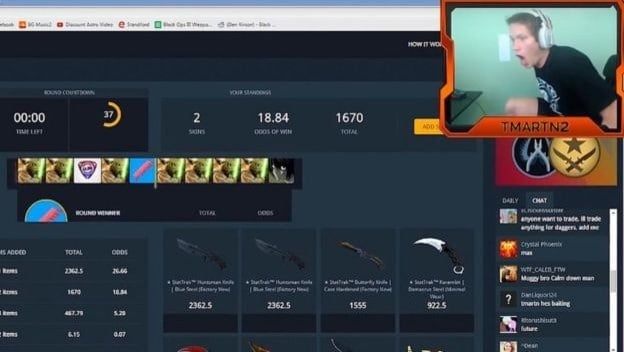There’s a shit-storm brewing, and at the center of it all is Valve and Counter-Strike: Global Offensive . Remember that sentence, because I’m going to come back to it in a minute. First, if you don’t know what’s been going on and are unaware of the CS:GO skin lotto controversy, let me get you caught up. CS:GO is one of the most popular online shooters in the world, developed and published by Valve. Besides skill in playing the game, the main way professional players and enthusiasts distinguish themselves from the masses is with by the acquisition and exhibition of premium weapon skins. Skins are typically acquired randomly through crate drops in-game, and top-tier skins are extremely rare and valuable; worth staggering amounts of cash, in fact.
Now why in the hell these weapon skins are considered so valuable and desirable is beyond me, but players are willing to spend a lot of money on them – some skins sell of thousands of dollars. This has led to a thriving scene of online skin lottery fronts: sites where you can go and pay a few dollars for a key to unlock a random skin that could be worth pennies, or worth thousands. I’ll let you guess what kind of skin is most commonly awarded. Players can also come together to bet their full pot of valuable goods on the line in a coin toss. Two players go in with thousands of dollars worth of digital goods; one player comes out with it all.
Pretty weird, right? And you have 13-year-olds participating in these slot machine skin dispensers and betting against other real human beings. That’s gambling. Period. Two extremely popular YouTubers and CS:GO players, “TmarTN” and “ProSyndicate,” have been making videos since December promoting one lottery site in particular called CS:GO Lotto. Trevor Martin (TmarTN) specifically has produced some extremely dramatic videos live-streaming himself logging onto the site and winning thousands of dollars. These videos have titles like “How to win $13,000 in Ten Minutes,” and there are young and impressionable gamers everywhere who look up to these dudes and watch these videos.
That’s bad enough, that Martin and his partner would so enthusiastically promote a site where you could potentially gamble away large sums of money, but it’s been recently revealed that Martin himself owns CS:GO Lotto. Good ‘ol ProSyndicate? He’s the VP, and his real name is Tom Cassel. So these two shits have, for months, been promoting a site that they claimed to have found as ordinary gamers – all the while faking their reactions to staged rounds of betting where they would “win” thousands of dollars. Neither of them ever disclosed the fact that they owned the site and, well, that’s super unethical if not highly illegal. Since their exposure, Martin has been trying to cover his tracks and conduct some serious damage control, but you can’t hide from the internet. Super sleuths have already amassed mounds of damning evidence proving that they never provided any kind of disclosure.

Everyone seems to be in agreement that these two guys deserve to face some serious consequences, but now I’d like to return our attention to the very first sentence of this article. Where was Valve in all of this, and how much did Valve know? After all, Valve has cooperated with several of these third-party sites to enable users to link their Steam accounts for the trading of skins. Certainly before making that happen, Valve made sure that it was operating legally, however dark that legal gray area may be, so as to not assume dangerous liability. Valve has enabled and encouraged this underground gray market to flourish by allowing the trading of these skins that people are paying so much money to obtain, even knowing that its player-base is composed of so many younger users.
Trevor Martin and Tom Cassel need to be held accountable, but let’s not forget Valve in all of this. Valve had a role to play here, and all the while, Valve had the power to put an end to it if it saw that things were getting out of hand or crossing certain lines of morality that seem very plainly drawn to anyone with common sense and decency. How much money does Valve stand to lose by shutting down the skin trade, and has that been a motive for it remaining totally silent during all of this? We’ve heard from Trevor Martin – he won’t shut up. Now I want to hear from Gabe Newell.
